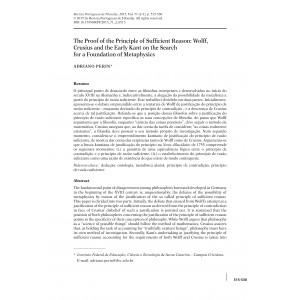ANDERSON, R. Lanier. "The Wolffian paradigm and its discontent: Kant's containment definition of analyticity in historical context". In: Archiv fur Geschichte der Philosophie. 87 (2005), pp. 22-74. DOI 10.1515/agph.2005.87.1.22
BECK, Lewis White. Early German philosophy: Kant and his predecessors. Bristol: Thoemmes Press, 1996.
CORR, Charles Anthony. "Christian Wolff's treatment of scientific discovery”. In: Journal of the history of philosophy . 10 (1972), pp. 323-334. DOI 10.1353/hph.2008.1585
CRUSIUS, Christian August. Dissertatio de usu et limitibus principii rationis determinantis vulgo sufficientis. Leipzig. In Die philosophischen Hauptwerke. Ed. S. Carboncini and R. Finster. Hildesheim: Olms, 1743.
CRUSIUS, Christian August. Entwurf der nothwendigen Vernunftwahrheiten, wiefern sie den zufälligen entgegen gesetzet werden. In Die philosophischen Hauptwerke. Ed. G. Tonelli. Hildesheim: Olms,1745.
CRUSIUS, Christian August. Weg zur Gewißheit und Zuverlässigkeit der menschlichen Erkenntnis. Leipzig. In Die philosophischen Hauptwerke. Ed. G. Tonelli. Hildesheim: Olms, 1747.
KANT, Immanuel. Versuch den Begriff der negativen Größen in die Weltweisheit einzuführen. In Gesammelte Schriften. Berlin: Akademie der Wissenschaften, 1905.
KANT, Immanuel. Kritik der reinen Vernunft. In Gesammelte Schriften. Berlin: Akademie der Wissenschaften, 1911.
KANT, Immanuel. Principiorum primorum cognitionis metaphysicae nova dilucidatio. In Gesammelte Schriften. Berlin: Akademie der Wissenschaften, 1963.
KANT, Immanuel. Reflexionen zur Metaphysik. In Gesammelte Schriften. Berlin: Akademie der Wissenschaften, 1995.
LONGUENESSE, Béatrice. “Kant’s Deconstruction of the Principle of Sufficient Reason”. In: The Harvard Review . 9 (2001), pp. 67-87.
LÜTHJE, Hans. “Christian Wolffs Philosophiebegriff”. In: Kantstudien. 30 (1925), pp. 39-66. DOI 10.1515/kant.1925.30.1-2.39
PREZIOSO, Faustino. Antonio.“I primi princípi della conoscenza nei filosofi anteriori a Kant”. In: Sapienza. 24 (1971), pp. 385-406.
WOLFF, Christian. Vernünftige Gedanken von den Kräfften des menschlichen Verstandes und ihrem richtigen Gebrauche in Erkänntnis der Wahrheit (Deutsche Logik). In Gesammelte Werke. Ed. H. W. Arndt. Hildesheim: Olms, 1712.
WOLFF, Christian. Vernünftige Gedanken von Gott, der Welt und der Seele des Menschen, auch allen Dingen überhaupt (Deutsche Metaphysik). In Gesammelte Werke. Ed. E. C. A. Corr. Hildesheim: Olms, 1719.
WOLFF, Christian. Discursus praeliminares de philosophia in genere. Philosophia rationalis sive Logica, methodo scientifica pertractata et ad usum scientiarum atque vitae aptata. In Gesammelte Werke. Ed. J. École. Hildesheim: Olms, 1728.
WOLFF, Christian. Philosophia prima, sive ontologia, methodo scientifica pertractata, qua omnis cognitiones humanae principia continentur. In Gesammelte Werke. J. École. Hildesheim: Olms, 1736.
VAN PEURSEN, Cornelis Anthonie. “Christian Wolff's philosophy of contingent reality”. In: Journal of the history of philosophy. 25 (1987), pp. 69-82. DOI 10.1353/hph.1987.0005









